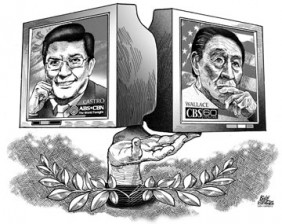Legacies

Angelo Castro Jr. of ABS-CBN and correspondent Mike Wallace of the famed CBS documentary program 60 Minutes died days apart from each other; Castro on Maundy Thursday and Wallace on Black Saturday.
Both belonged to major networks. While Angelo Castro didn’t have the international exposure Wallace had, he nevertheless earned the respect of peers in the broadcasting industry.
Castro was an anchor on the World Tonight when the newly reopened ABS-CBN was resuming its charge as the leading English TV news program in the country.
When late night TV news programs shifted to Tagalog, Castro’s smooth baritone and calming presence found a new home in ANC, the 24-hour English cable news of ABS-CBN where he stayed until he fell will with lung cancer.
Wallace led a more colorful life and figured in several controversies. One of the biggest, the controversial edited interview of Big Tobacco whistleblower Jeffrey Wiggand, became the subject of a Wall Street Journal piece entitled “The Man Who Knew Too Much” and the 1995 movie “The Insider.”
Article continues after this advertisementWhen the 93-year-old Wallace passed away in his New Connecticut home, tributes came like a sudden downpour on a hot summer day. One anecdote told how he was once considered for appointment as White House press secretary by president Richard Nixon.
Article continues after this advertisementA Nixon official recounted that Wallace managed to escort Nixon’s wife out of a large crowd of reporters who wanted to interview her following her husband’s ascension to the presidency.
That singular act of compassion, just one of many facets of Wallace’s multi-layered character, showed him not only willing to empathize with newsmakers but also quick to recognize when they turn into ordinary human beings.
Angelo Castro’s death was eulogized by Malacañang as the “end of an era of gentlemanly broadcasting.” His smooth, authoritative delivery of the evening news was certainly a more urbane version of some of the hyper shrill styles we get on the air today.
The legacies of both men will be remembered not only by their surviving peers but by journalists around the world, where press freedom is challenged not just by regimes and local politics but by evolving technologies and social media where reporting a story has never been more accessible to the common person.
Their kind of commitment to the profession of factual reporting is needed now more than ever.